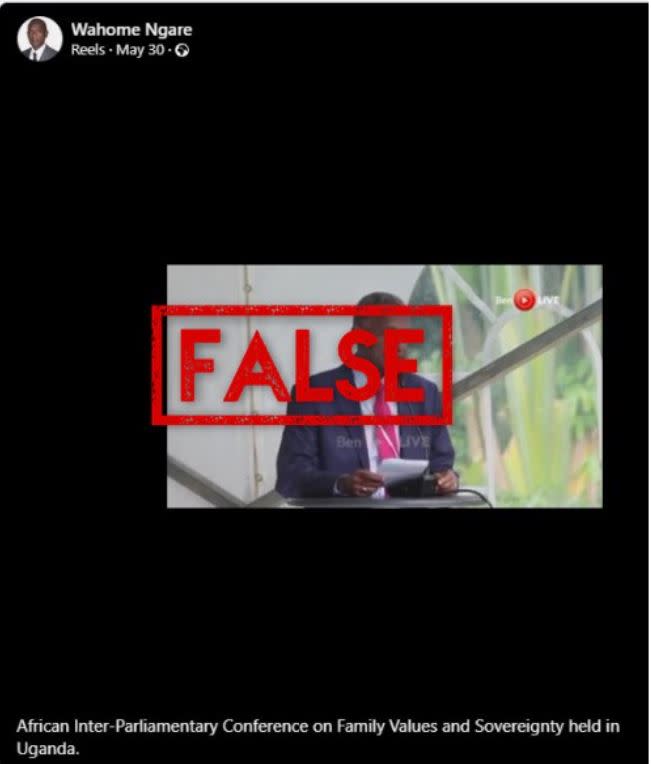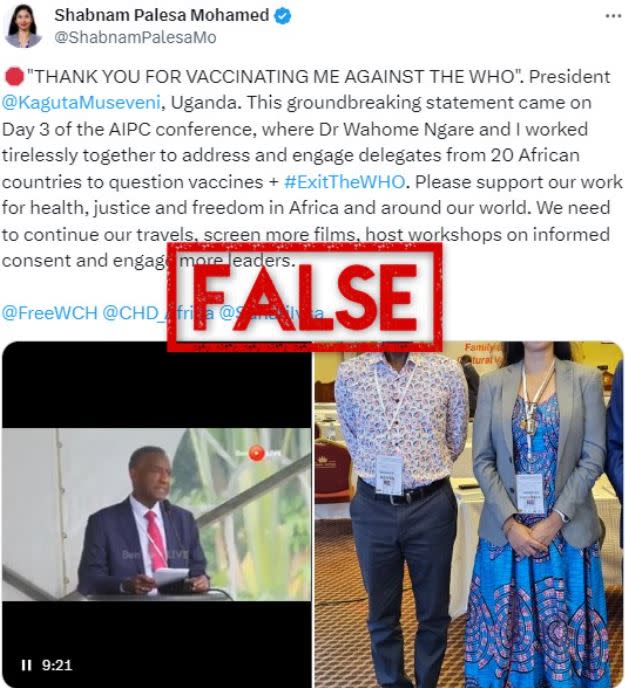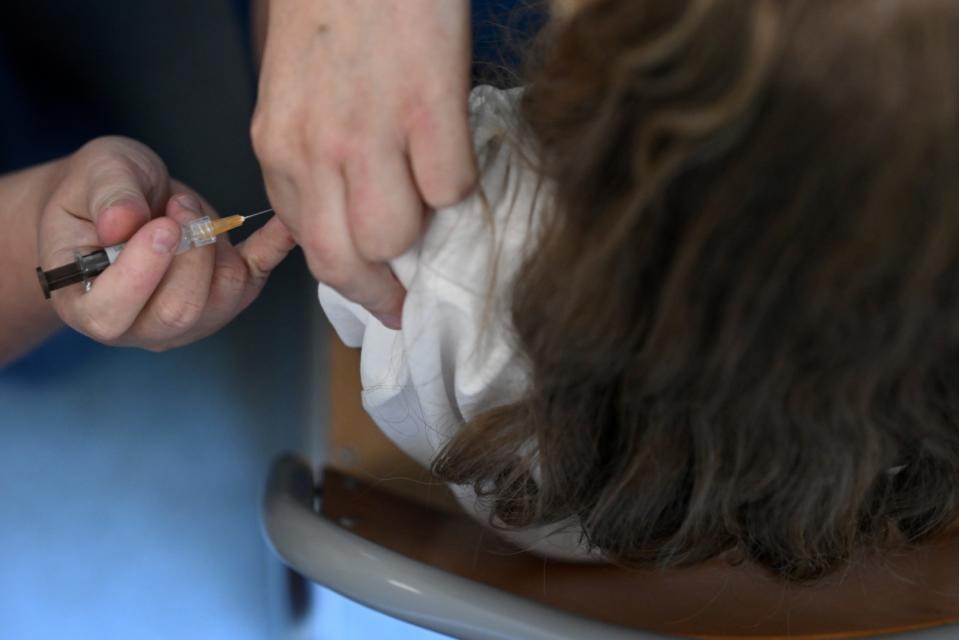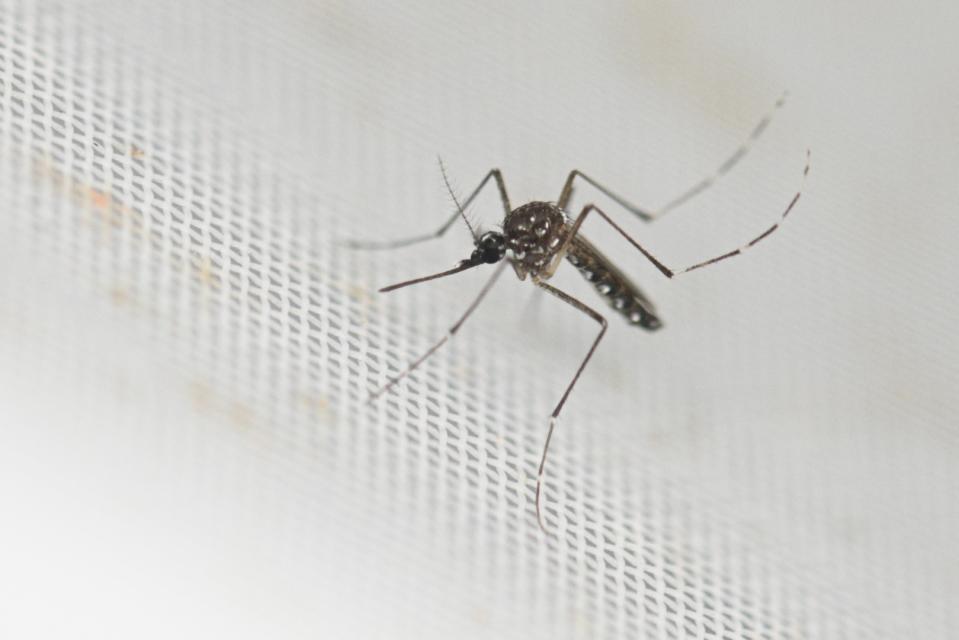Kenyan doctor spreads harmful disinformation about the WHO, vaccines and infertility
Kenyan doctor Wahome Ngare claimed several vaccines were “unnecessary” because they were designed to “reduce African fertility”, at a recent conference attended by Uganda's president. Ngare also accused the World Health Organization (WHO) of trying to assert control over governments worldwide. However, his allegations are misleading and not based on scientific evidence. The WHO defended its role as a purely advisory body and reassured the public about the safety of the vaccines.
Ngare, an obstetrician-gynaecologist with a medical practice in Kenya’s capital Nairobi, shared the video of his address as a Facebook Reel on May 30, 2024.

Two days earlier, the video was posted on a YouTube channel called “Ben LIVE” before being taken down.
It was also shared on X by Shabnam Palesa Mohamed, who describes herself on social media as an activist from South Africa.

Mohamed is affiliated with the so-called Africa chapter of Children's Health Defense (CHD), an organisation linked to US presidential candidate Robert F. Kennedy Jr (archived here).
AFP Fact Check has debunked vaccine-linked disinformation spread by both Kennedy and the CHD, including here and here.
It has also fact-checked other false claims by Ngare, a well-known critic of vaccines (archived here).
Advisory or governing body?
Ngare spoke at the African Inter-Parliamentary Conference on Family Values and Sovereignty in Uganda at the beginning of May.
According to Ugandan media (archived here), the conference addressed the potential revision of WHO’s International Health Regulations (IHR), the agenda for a pandemic treaty, and the transgender healthcare guidelines advocated by the WHO.
During his address, Ngare called on African leaders to reject the proposed amendments to the IHR, which he claimed would change the WHO “from an advisory organisation into a governing body”.
He levelled similar criticism at the proposed pandemic agreement, saying it would see countries relinquishing control over decision-making about health issues to the WHO.
The WHO refuted the allegations.
The amendments to the IHR are intended to establish a transparent procedure for addressing “public health emergencies of international concern to ensure the world is better prepared for the next pandemic”, it told AFP Fact Check.
Similarly, the goal of the pandemic accord is to “enhance the readiness, prevention, and response capabilities of the WHO’s member countries for future pandemics, with a focus on promoting fairer access to vaccines and medications” (archived here).
“WHO cannot change a country’s rules or laws; only countries can do this, under their own domestic laws. Countries are sovereign states and make their own decisions,” the global health body said.
“WHO’s role is to provide evidence-based advice and support, which countries can decide to follow or not.”
AFP Fact Check has debunked similar claims in Thailand and the United States.
HPV vaccine
In his speech, Ngare also alleged that the vaccine against the human papillomavirus (HPV) caused infertility in women. Pap smears, he argued, were better for both Africa and early cancer detection.
International research suggests that pap smears have significantly reduced cervical cancer rates in other parts of the world (archived here).
However, HPV vaccination offers the potential to prevent a broader range of cancers beyond cervical cancer.
“Pap smear testing can only identify cervical pre-cancers and does not address other HPV-related anogenital cancers or oropharyngeal cancers,” the WHO said.
It can also guard against precancerous conditions typically screened for during pap smears, potentially reducing the necessity for treating such precancers.
Cervical cancer is mainly caused by HPV (achieved here), with HPV 16 and 18 being responsible for over 70 percent of cases (achieved here). These can be prevented through vaccination. Additionally, HPV strains are linked to other types of cancer (archived here).

Studies show that the United States recommended the use of the HPV vaccine for female adolescents and young adults in 2006 and for male adolescents and young adults in 2009 (archived here).
According to the Centers for Disease Control and Prevention (CDC), while the recommended age for HPV vaccination is 11-12 years, it can be started as early as nine. All pre-adolescents should receive the jab to protect them from HPV infections that may lead to cancer in the future (archived here).
AFP Fact Check has debunked other claims about HPV vaccines, including here and here (archived here and here).
Malaria shot
Malaria remains a public health challenge in Africa, where around 95 percent of global malaria-related deaths occurred in 2022 — with children under five accounting for around 80 percent of mortality (archived here).
The mosquito-borne disease killed over 600,000 people in 2022, with more than half of them in just four African countries (archived here).
The WHO approved the first malaria vaccine in 2021, with a second vaccine authorised in 2023 (archived here).
Both vaccines were shown to be safe and effective in phase 3 clinical trials (archived here).

Again, Ngare claimed malaria shots were used to decrease the African population. He said the WHO should eradicate the disease, as it has done in other continents.
Malaria has been successfully eradicated in more than 40 countries, including African nations such as Lesotho, Cape Verde, Algeria, Mauritius, Seychelles, Libya, and Morocco (archived here).
But the WHO says that controlling malaria in Africa still presents a significant challenge due to two types of mosquitoes that are highly effective vectors for the disease (archived here).
Additionally, the predominant malaria species in Africa is exceptionally deadly, being responsible for the majority of malaria cases and fatalities (archived here).
Artemisia treatment
Instead of vaccination, Ngare advocates natural remedies to treat malaria, namely the African-cultivated Artemisia plant tea. The active ingredient found in the dried leaves of the plant is called artemisinin and is known to help treat malaria.
To support his claims, Ngare cited a research paper by a Congolese doctor that purportedly illustrated the efficacy of Artemisia tea when treating malaria.
However, AFP Fact Check found the paper was retracted due to concerns about the reliability of data and the absence of patient approval (archived here).
The WHO recommends artemisinin-based combination therapies (ACTs) as a preferred treatment for malaria (archived here).
“ACTs contain derivatives of artemisinin combined with other substances, and these reduce the number of malaria parasites in the body,” it said.
However, people living in areas affected by malaria often face difficulties in obtaining ACTs. In certain countries, these treatments may be available only at very high prices or in low quality.
As noted by the WHO, these barriers have resulted in the promotion of various products made from Artemisia plant materials, such as teas, tablets, and capsules, as alternative remedies for malaria.
Traditional herbal remedies can be problematic when treating malaria. Issues can include “variations in how the plants are cultivated, the preparation of formulations, determining the appropriate dosage, ensuring quality control, and demonstrating the safety and efficacy of these treatments in a clinical setting”.
There is also concern from the WHO that the use of Artemisia herbal remedies may accelerate the emergence and transmission of artemisinin resistance which has been observed in some regions.
Tetanus
Ngare also made an unfounded claim that Kenyan women were secretly sterilised during Kenya's tetanus vaccination drive.
In 2013, the WHO partnered with the Kenyan government to launch a vaccination campaign for women of reproductive age to address neonatal tetanus.
Five years later, Kenya achieved a significant milestone — the country was deemed to have eliminated maternal and neonatal tetanus (archived here). The WHO defines elimination as the reduction of neonatal tetanus cases to fewer than one per 1,000 live births annually.
However, the programme was also subject to claims that the programme was secretly being used for mass sterilisations.
But there is no compelling proof that this is true.
In 2014, the WHO and the UN Children's Fund (UNICEF) expressed their “deep concern” over the claims.

“These grave allegations are not backed up by evidence, and risk negatively impacting national immunisation programmes for children and women," the agencies said in a statement.
“WHO and UNICEF confirm that the vaccines are safe and are procured from a pre-qualified manufacturer,” they added.
“Given most tetanus cases in Kenya are among newborns, the target of Kenya's TT vaccination campaigns is girls and women (15-49 years), with a particular emphasis on those in the most marginalized areas.”
Other scientific organisations including the Catholic Physicians Throughout the World (FIAMC) backed the WHO's vaccination drive.
“If tetanus toxoid vaccines given to millions of women in many countries was capable of causing infertility there would by now be ample demographic data to confirm this. We know of no such data,” FIAMC said at the time (archived here).
Uganda responds
Uganda’s health ministry has hit back at Ngare's claims, describing them as baseless misinformation (archived here).
Dear people of good will. The Govt of Uganda through MoH is mandated to improve the health of its citizens. Successes have been documented in the UDHS 2022. Let's reject Antivaxers with their deliberate distortions of scientific facts. Trust MoH for better health pic.twitter.com/W0Kd11cZTr
— Dr Ronald Miria Ocaatre (@OcaatreRonald) June 12, 2024
“We take note of the misinformation generated from a lack of verified scientific evidence, confusion and peddling to destroy a very valuable public health program that saves lives,” reads a statement dated June 12, 2024, published on social media and in newspapers.


